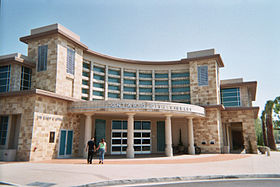Inland Empire (CA)
| Inland Empire | |
|---|---|
| Metropolitan area | |

|
|
 Riverside |
|
 Ontario |
|
| Country |
|
| State |
|
| Counties |
|
| Ten largest cities by population (2010 U.S. Census) | - Riverside (RV) - San Bernardino (SB) - Fontana (SB) - Moreno Valley (RV) - Rancho Cucamonga (SB) - Ontario (SB) - Corona (RV) - Victorville (SB) - Temecula (RV) - Murrieta (RV) |
| Area | |
| • Metro | 27,298 sq mi (70,669 km2) |
| Elevation | −220 – 11,499 ft (−67.1 – 3,507 m) |
| Population (2010) | |
| • Density | 147.5/sq mi (56.9/km2) |
| • Urban | 1,506,816 (25th) |
| • Urban density | 3,434.1/sq mi (1,325.9/km2) |
| • Metro | 4,224,851 (13th) |
| Time zone | PST (UTC−08:00) |
| • Summer (DST) | PDT (UTC−07:00) |
The Inland Empire (I.E.) is a metropolitan area and region in Southern California. The term may be used to refer to the cities of western Riverside County and southwestern San Bernardino County. A broader definition will include eastern Los Angeles County cities in the Pomona Valley, and sometimes the desert communities of Palm Springs and the rest of the Coachella Valley; a much larger definition includes all of San Bernardino and Riverside counties.
The U.S. Census Bureau-defined Riverside-San Bernardino-Ontario metropolitan area, which comprises Riverside County and San Bernardino County, California, covers more than 27,000 square miles (70,000 km2) and has a population of approximately 4 million. Most of the area's population is located in southwestern San Bernardino County and northwestern Riverside County. At the end of the nineteenth century, the Inland Empire was a major center of agriculture, including citrus, dairy, and wine-making. However, agriculture declined through the twentieth century, and since the 1970s a rapidly growing population, fed by families migrating in search of affordable housing, has led to more residential, industrial, and commercial development.
The term "Inland Empire" is documented to have been used by the Riverside Enterprise newspaper (now The Press-Enterprise) as early as April 1914. Developers in the area likely introduced the term to promote the region and to highlight the area's unique features. The "Inland" part of the name is derived from the region's location, about 60 miles (97 km) inland from Los Angeles and the Pacific Ocean. Originally, this area was called the Orange Empire due to the acres of citrus groves that once extended from Pasadena to Redlands during the first half of the twentieth century. The Inland Empire is a nebulous region, but is defined as the cities of western Riverside County and the cities of southwestern San Bernardino County; adjacent to the Los Angeles metropolitan area. A generally broader definition will include the desert community of Palm Springs and its surrounding area, and a much larger definition will include all of San Bernardino and Riverside counties.
...
Wikipedia
